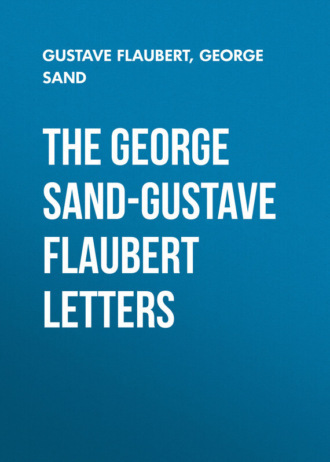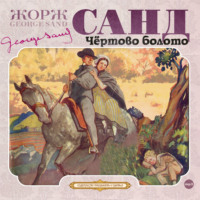 полная версия
полная версияThe George Sand-Gustave Flaubert Letters
We love you, we embrace you.
I thank you for coming to see Cadio.
G. Sand
XCI. TO GEORGE SAND
Does that astonish you, dear master? Oh well! it doesn't me! I told you so but you would not believe me.
I am sorry for you. For it is sad to see the friends one loves change. This replacement of one soul by another, in a body that remains the same as it was, is a distressing sight. One feels oneself betrayed! I have experienced it, and more than once.
But then, what idea have you of women, O, you who are of the third sex? Are they not, as Proudhon said, "the desolation of the Just"? Since when could they do without delusions? After love, devotion; it is in the natural order of things. Dorine has no more men, she takes the good God. That is all.
The people who have no need of the supernatural, are rare. Philosophy will always be the lot of the aristocrats. However much you fatten human cattle, giving them straw as high as their bellies, and even gilding their stable, they will remain brutes, no matter what one says. All the advance that one can hope for, is to make the brute a little less wicked. But as for elevating the ideas of the mass, giving it a larger and therefore a less human conception of God, I have my doubts.
I am reading now an honest book (written by one of my friends, a magistrate), on the Revolution in the Department of Eure. It is full of extracts from writings of the bourgeois of the time, simple citizens of the small towns. Indeed I assure you that there is now very little of that strength! They were literary and fine, full of good sense, of ideas, and of generosity.
Neo-catholicism on the one hand, and Socialism on the other, have stultified France. Everything moves between the Immaculate Conception and the dinner pails of the working people.
I told you that I did not flatter the democrats in my book. But I assure you that the conservatives are not spared. I am now writing three pages on the abominations of the national guard in June, 1848, which will cause me to be looked at favorably by the bourgeois. I am rubbing their noses in their own dirt as much as I can. But you don't give me any details about Cadio. Who are the actors, etc.? I mistrust your novel about the theatre. You like those people too much! Have you known any well who love their art? What a quantity of artists there are who are only bourgeois gone astray!
We shall see each other in three weeks at the latest. I shall be very glad of it and I embrace you.
And the censorship? I really hope for you that it will make some blunders. Besides, I should be distressed if it was wanting in its usual habits.
Have you read this in the paper? "Victor Hugo and Rochefort, the greatest writers of the age." If Badinguet now is not avenged, it is because he is hard to please in the matter of punishments.
XCII. TO GUSTAVE FLAUBERT
The halcyons skim over the water and are common every where. The name is pretty and sufficiently well known.
I embrace you.
Your troubadour.
Paris, Friday evening, 28 August or 4 September, 1868. In October, yes, I will try!
XCIII. TO GEORGE SAND
Saturday evening
I received your two notes, dear master. You send me "halcyon" to replace the word, "dragonfly." Georges Pouchet suggested gerre of the lakes (genus, Gerris). Well! neither the one nor the other suits me, because they do not immediately make a picture for the ignorant reader.
Must I then describe that little creature? But that would retard the movement! That would fill up all the landscape I shall put "insects with large feet" or "long insects." That would be clear and short.
Few books have gripped me more than Cadio, and I share entirely
Maxime's [Footnote: Maxime Du Camp.] admiration.
I should have told you of it sooner if my mother and my niece had not taken my copy. At last, this evening, they gave it back to me; it is here on my table, and I am turning the pages as I write you.
In the first place, it seems to me as if IT OUGHT TO HAVE BEEN THE WAY IT IS! It is plain, it gets you and thrills you. How many people must be like Saint-Gueltas, like Count de Sauvieres, like Rebec! and even like Henri, although the models are rarer. As for the character of Cadio, which is more of an invention than the others, what I like best in him is his ferocious anger. In it is the special truth of the character. Humanity turned to fury, the guillotine become mystic, life only a sort of bloody dream, that is what must take place in such heads. I think you have one Shakespearean scene: that of the delegate to the Convention with his two secretaries, is of an incredible strength. It makes one cry out! There is one also which struck me very much at the first reading: the scene where Saint-Gueltas and Henri each have the pistols in their pockets: and many others. What a fine page (I open by chance) is page 161!
In the play won't you have to give a longer role to the wife of the good Saint-Gueltas? The play ought not to be very hard to cut. It is only a question of condensing and shortening it. If it is played, I'll guarantee a terrific success. But the censorship?
Well, you have written a masterpiece, that's true! and a very amusing one. My mother thinks it recalls to her stories that she heard while a child. A propos of Vendee, did you know that her paternal grandfather was, after M. Lescure, the head of the Vendee army? The aforesaid head was named M. Fleuriot d'Argentan. I am not any the prouder for that; besides the thing is doubtful, for my grandfather, a violent republican, hid his political antecedents.
My mother is going in a few days to Dieppe, to her grandchild's. I shall be alone a good part of the summer, and I plan to grub.
"I labor much and shun the world.
It is not at balls that the future is founded."
(Camilla Doucet.)
But my everlasting novel bores me sometimes in an incredible manner! These tiny details are stupid to bother with! Why annoy oneself about such a miserable subject?
I would write you at length about Cadio; but it is late and my eyes are smarting.
So, thank you, very kindly, my dear master.
XCIV. To M. GUSTAVE FLAUBERT, at Croissset
Paris, end of September, 1868
Dear friend,
It is for Saturday next, 3rd October. I am at the theatre every evening from six o'clock till two in the morning. They talk of putting mattresses behind the scenes for the actors who are not in front. As for me, as used to wakefulness as you are, I experience no fatigue; but I should be very much bored if I had not the resource that one has always, of thinking of other things. I am sufficiently accustomed to it to be writing another play while they are rehearsing, and there is something quite exciting in these great dark rooms where mysterious characters move, talking in low tones, in unexpected costumes; nothing is more like a dream, unless one imagines a conspiracy of patients escaped from Bicetre.
I don't at all know what the performance will be. If one did not know the prodigies of harmony and of vim which occur at the last moment, one would judge it all impossible, with thirty-five or forty speaking actors of whom only five or six speak well. One spends hours over the exits and entrances of the characters in blue or white blouses who are to be the soldiers or the peasants, but who, meanwhile perform incomprehensible manoeuvres. Still the dream. One has to be a madman to put on these things. And the frenzy of the actors, pale and worn out, who drag themselves to their place yawning, and suddenly start like crazy people to declaim their tirade; continually the assembling of insane people.
The censorship has left us alone as regards the manuscript; tomorrow these gentlemen will inspect the costumes, which perhaps will frighten them.
I left my dear world very quiet at Nohant. If Cadio succeeds, it will be a little DOT for Aurore; that is all my ambition. If it does not succeed, I shall have to begin over again, that is all.
I shall see you. Then, in any case, that will be a happy day. Come to see me the night before, if you arrive the night before, or even the same day. Come to dine with me the night before or the same day; I am at home from one o'clock to five. Thank you; I embrace you and I love you.
G. Sand
XCV. TO GUSTAVE FLAUBERT
Paris, 5 October, 1868
Dear good friend, I recommend again to your good offices, my friend Despruneaux, so that you will again do what you can to be of use to him in a very just suit which has already been judged in his favor.
Yours,
G. Sand
XCVI. TO GUSTAVE FLAUBERT
Nohant, 15 October, 1868
Here I am "ter hum" where, after having hugged my children and my grandchildren, I slept thirty-six hours at one stretch. You must believe that I was tired and did not notice it. I am waking from that animal-hibernation and you are the first person to whom I want to write. I did not thank you enough for coming to Paris for my sake, you who go about so little: and I did not see you enough either; when I knew that you had supped with Plauchut, [Footnote: Edmond Plauchut, a writer and a friend of George Sand.] I was angry at having stayed to take care of my sickly Thuillier, to whom I was of no use, and who was not particularly pleased about it. Artists are spoiled children and the best are great egoists. You say that I like them too well; I like them as I like the woods and the fields, everything, every one that I know a little and that I study continually. I make my life in the midst of all that, and as I like my life I like all that nourishes it and renews it. They do me a lot of ill turns which I see, but which I no longer feel. I know that there are thorns in the hedges, but that does not prevent me from putting out my hands and finding flowers there. If all are not beautiful, all are interesting. The day you took me to the Abbey of Saint-Georges I found the scrofularia borealis, a very rare plant in France. I was enchanted; there was much…in the neighborhood where I gathered it. Such is life!
And if one does not take life like that, one cannot take it in any way, and then how can one endure it? I find it amusing and interesting, and since I accept EVERYTHING, I am so much happier and more enthusiastic when I meet the beautiful and the good. If I did not have a great knowledge of the species, I should not have quickly understood you, or known you or loved you. I can have an enormous indulgence, perhaps banal, for I have had to practice it so much; but appreciation is quite another thing, and I do not think that it is entirely worn out in your old troubadour's mind.
I found my children still very good and very tender, my two little grandchildren still pretty and sweet. This morning I dreamed, and I woke up saying this strange sentence: "There is always a youthful great first part in the drama of life. First part in mine: Aurore." The fact is that it is impossible not to idolize that little one. She is so perfect in intelligence and goodness, that she seems to me like a dream.
You also, without knowing it, YOU ARE A DREAM … like that. Plauchut saw you once, and he adored you. That proves that he is not stupid. When he left me in Paris, he told me to remember him to you.
I left Cadio in doubt between good and average receipts. The cabal against the new management relaxed after the second day. The press was half favorable, half hostile. The good weather is against it. The hateful performance of Roger is also against it. So that we don't know yet if we shall make money or not. As for me, when money comes, I say, "So much the better," without excitement, and if it does not come, I say, "So much the worse," without any chagrin. Money not being the aim, ought not to be the preoccupation. It is, moreover, not the real proof of success, since so many vapid or poor things make money.
Here I am with another play already underway, so as to keep my hand in. I have a novel also on the stocks, on the STROLLING PLAYERS. I have studied them a good deal this time without learning anything new. I already had the plot. It is not complicated and is very logical.
I embrace you tenderly as well as your little mother. Give me some sign of life. Does the novel get on?
G. Sand
XCVII. TO GEORGE SAND
Saturday evening
I am remorseful for not having answered at length your last letter, my dear master. You told me of the "ill turns" that people did you. Did you think that I did not know it? I confess to you even (between ourselves), that I was hurt on account of them more because of my good taste, than because of my affection for you. I did not think that several of your friends were warm enough towards you. "My God! my God! how mean literary men are!" A bit out of the correspondence of the first Napoleon. What a nice bit, eh? Doesn't it seem to you that they belittle him too much?
The infinite stupidity of the masses makes me indulgent to individualities, however odious they may be. I have just gulped down the first six volumes of Buchez and Roux. The clearest thing I got out of them is an immense disgust for the French. My Heavens! Have we always been bunglers in this fair land of ours? Not a liberal idea which has not been unpopular, not a just thing that has not caused scandal, not a great man who has not been mobbed or knifed! "The history of the human mind is the history of human folly!" as says M. de Voltaire.
And I am convinced more and more of this truth: the doctrine of grace has so thoroughly permeated us that the sense of justice has disappeared. What terrified me so in the history of '48 has quite naturally its origins in the Revolution, which had not liberated itself from the middle ages, no matter what they say. I have re- discovered in Marat entire fragments of Proudhon (sic) and I wager that they would be found again in the preachers of the League.
What is the measure that the most advanced proposed after Varennes? Dictatorship and military dictatorship. They close the churches, but they raise temples, etc.
I assure you that I am becoming stupid with the Revolution. It is a gulf which draws me in.
However, I work at my novel like a lot of oxen. I hope on New Year's Day not to have over a hundred pages more to write, that is to say, still six good months of work. I shall go to Paris as late as possible. My winter is to pass in complete solitude, good way of making life run along rapidly.
XCVIII. TO GUSTAVE FLAUBERT, in Paris
Nohant, 20 November, 1868
You say to me, "When shall we see each other?" About the 15th of December, we are baptizing here our two little girls as Protestants. It is Maurice's idea; he was married before the pastor, and does not want the persecution and influence of the Catholic church about his children. Our friend Napoleon is the godfather of Aurore, and I am the godmother. My nephew is the godfather of the other. All that takes place just among ourselves, in the family. You must come, Maurice wants you to, and if you say no, you will disappoint him greatly. You shall bring your novel, and in a free moment, you shall read it to me; it will do you good to read it to one who listens well. One gets a perspective and judges one's work better. I know that. Say yes to your old troubadour, he will be EXCEEDINGLY GRATEFUL to you for it.
I embrace you six times if you say yes.
G. Sand
XCIX. TO GEORGE SAND
Tuesday
Dear master,
You cannot imagine the sorrow you give me! In spite of the longing I have, I answer "no." Yet I am distracted with my desire to say "yes." It makes me seem like a gentleman who cannot be disturbed, which is very silly. But I know myself: if I go to your house at Nohant, I shall have a month of dreaming about my trip. Real pictures will replace in my brain the fictitious pictures which I compose with great difficulty. All my house of cards will topple over.
Three weeks ago because I was foolish enough to accept an invitation to dinner at a country place nearby, I lost four days (sic). What would it be on leaving Nohant? You do not understand that, you strong Being! I think that you will be a little vexed with your old troubadour for not coming to the baptism of the two darlings of his friend Maurice? The dear master must write to me if I am wrong, and to give me the news!
Here is mine! I work immoderately and am absolutely ENCHANTED by the prospect of the end which begins to be visible.
So that it may arrive more quickly, I have made the resolution to live here all winter, probably until the end of March. Even admitting that everything goes perfectly, I shall not have finished all before the end of May. I don't know anything that goes on and I read nothing, except a little of the French Revolution, after my meals, to aid digestion. I have lost my former good habit of reading every day in Latin. Therefore I don't know a word of it any more! I shall polish it up again when I am freed from my odious bourgeois, and I am nowhere near it.
My only excitement consists in going to dine on Sundays at Rouen with my mother. I leave at six o'clock, and I am home at ten. Such is my life.
Did I tell you that I had a visit from Tourgueneff? How you would love him!
Sainte-Beuve gets along. Anyway, I shall see him next week when I am in Paris for two days, to get necessary information What is the information about? The national guard!!!
Listen to this: le Figaro not knowing with what to fill its columns, has had the idea of saying that my novel tells the life of Chancellor Pasquier. Thereupon, fear of the aforesaid family, which wrote to another part of the same family living in Rouen, which latter has been to find a lawyer from whom my brother received a visit, so that … in short, I was very stupid not to "get some benefit from the opportunity." Isn't it a fine piece of idiocy, eh?
C. TO GUSTAVE FLAUBERT, AT CEOISSET
Nohant, 21 December, 1868
Certainly, I am cross with you and angry with you, not from unreasonableness nor from selfishness, but on the contrary, because we were joyous and HILARIOUS and you would not distract yourself and amuse yourself with us. If it was to amuse yourself elsewhere, you would be pardoned in advance; but it was to shut yourself up, to get all heated up, and besides for a work which you curse, and which – wishing to do and being obliged to do anyhow, – you ought to be able to do at your ease and without becoming too absorbed in it.
You tell me that you are like that. There is nothing more to say; but one may well be distressed at having an adored friend, a captive in chains far away, whom one may not free. It is perhaps a little coquettish on your part, so as to make yourself pitied and loved the more. I, who have not buried myself alive in literature, have laughed and lived a great deal during these holidays, but always thinking of you and talking of you with our friend of the Palais Royal, [Footnote: Jerome Napoleon.] who would have been happy to see you and who loves you and appreciates you a great deal. Tourgueneff has been more fortunate than we, since he was able to snatch you from your ink-well. I know him personally very little, but I know his work by heart. What talent! and how original and polished! I think that the foreigners do better than we do. They do not pose, while we either put on airs or grovel: the Frenchman has no longer a social milieu, he has no longer an intellectual milieu.
I except you, you who live a life of exception, and I except myself, because of the foundation of careless unconventionally which was bestowed upon me; but I, I do not know how to be "careful" and to polish, and I love life too much, and I am amused too much by the mustard and all that is not the real "dinner," to ever be a litterateur. I have had flashes of it, but they have not lasted. Existence where one ignores completely one's "moi" is so good, and life where one does not play a role is such a pretty performance to watch and to listen to! When I have to give of myself, I live with courage and resolution, but I am no longer amused.
You, oh! fanatical troubadour, I suspect you of amusing yourself at your profession more than at anything in the world. In spite of what you say about it, art could well be your sole passion, and your shutting yourself up, at which I mourn like the silly that I am, your state of pleasure. If it is like that then, so much the better, but acknowledge it to console me.
I am going to leave you in order to dress the marionettes, for the plays and the laughter have been resumed with the bad weather, and that will keep us busy for a part of the winter, I fancy. Behold! here I am, the imbecile that you love, and that you call MASTER. A fine master who likes to amuse himself better than to work!
Scorn me profoundly, but love me still. Lina tells me to tell you that you are not much, and Maurice is furious too; but we love you in spite of ourselves and embrace you just the same. Our friend Plauchut wants to be remembered to you; he adores you too.
Yours, you huge ingrate,
G. Sand
I had read the hoax of le Figaro and had laughed at it. It turns out to have assumed grotesque proportions. As for me, they gave me a grandson instead of two granddaughters, and a Catholic baptism instead of a Protestant. That does not make any difference. One really has to lie a little to divert oneself.
CI. TO GEORGE SAND
Saint Sylvester's night, one o'clock, 1869
Why should I not begin the year of 1869 in wishing to you and to yours "Happy New Year and many of them"? It is rococo, but it pleases me. Now, let us talk.
No, I don't get into a heat, for I have never been better. They thought me, in Paris, "fresh as a young girl," and those people who don't know my life attributed that appearance of health to the air of the country. That is what conventional ideas are. Every one has his system. For my part, when I am not hungry, the only thing I can eat is dry bread. And the most indigestible food, such as apples in sour cider, and bacon, are what cure me of the stomach-ache. And so on. A man who has no common sense ought not to try to live according to common-sense rules.
As for my frenzy for work, I will compare it to an attack of herpes. I scratch myself while I cry. It is both a pleasure and a torture at the same time. And I am doing nothing that I want to! For one does not choose one's subjects, they force themselves on one. Shall I ever find mine? Will an idea fall from Heaven suitable to my temperament? Can I write a book to which I shall give myself heart and soul? It seems to me in my moments of vanity, that I am beginning to catch a glimpse of what a novel ought to be. But I still have three or four of them to write before that one (which is, moreover, very vague), and at the rate I am going, if I write these three or four, that will be the most I can do. I am like M. Prudhomme, who thinks that the most beautiful church would be one which had at the same time the spire of Strasbourg, the colonnade of Saint Peter's, the portico of the Parthenon, etc. I have contradictory ideals. Thence embarrassment, hesitation, impotence.
As to whether the "claustration" to which I condemn myself may be a "state of joy," no. But what can I do? To get drunk with ink is more worth while than to get drunk with brandy. The muse, cross-grained as she is, gives less trouble than a woman. I cannot harmonize the one with the other. I must choose. My choice was made a long time ago. There remains the matter of the senses. They have always been my servants. Even at the time of my earliest youth, I did exactly as I wanted with them. I have reached my fiftieth year, and it is not their ardor that troubles me.
This regime is not amusing, I agree to that. There are moments of empty and horrible boredom. But they become more and more rare in proportion as one grows older. In short, LIVING seems to me a business for which I was not made, and yet…!
I stayed in Paris for three days, which I made use of in hunting up information, and in doing errands about my book. I was so worn out last Friday, that I went to bed at seven o'clock in the evening. Such are my mad orgies at the capital.
I found the Goncourts in a frenzied (sic) admiration over a book entitled Histoire de ma vie by George Sand. Which proves more good taste than learning on their part. They even wanted to write to you to express all their admiration. (In return I found ***** stupid. He compares Feydeau to Chateaubriand, admires very much the Lepreux de la cite d'Aoste, finds Don Quichotte tedious, etc.).









